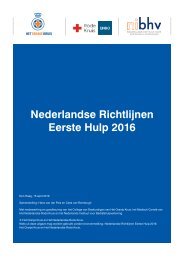Thesis-Anne-Vos-Masters-SBR-and-EU-Law-3
Thesis-Anne-Vos-Masters-SBR-and-EU-Law-3
Thesis-Anne-Vos-Masters-SBR-and-EU-Law-3
You also want an ePaper? Increase the reach of your titles
YUMPU automatically turns print PDFs into web optimized ePapers that Google loves.
those notions with the transparency principle is acknowledged by the CJ<strong>EU</strong>. 253 The Court has<br />
stated that "[i]t is (...) a lack of information <strong>and</strong> debate which is capable of giving rise to doubts in<br />
the minds of citizens, not only as regards the lawfulness of an isolated act, but also as regards the<br />
legitimacy of the decision-making process as a whole". 254 This link is also established in Regulation<br />
(EC) No 1049/2001 of 30 May 2001 regarding public access to European Parliament, Council <strong>and</strong><br />
Commission documents to all Community institutions <strong>and</strong> bodies (the Dutch version hereof is the<br />
Wet openbaarheid bestuur). 255 These notions are also implemented in the Treaties. Nowadays, the<br />
Lisbon Treaty provides in Art. 1 T<strong>EU</strong> that "[t]his Treaty marks a new stage in the process of<br />
creating an ever closer union among the peoples of Europe, in which decisions are taken as openly<br />
as possible (…)". Article 11(2) <strong>and</strong> (3) T<strong>EU</strong> require the <strong>EU</strong> institutions to "maintain an open,<br />
transparent <strong>and</strong> regular dialogue with representative associations <strong>and</strong> civil society" <strong>and</strong> the<br />
Commission to "carry out broad consultations with parties concerned in order to ensure that the<br />
Union's actions are coherent <strong>and</strong> transparent".<br />
Also, Article 15(1) TF<strong>EU</strong> states that the Union's institutions, bodies, offices <strong>and</strong> agencies shall<br />
conduct their work as openly as possible. Moreover, paragraph 2 obliges the EP to meet in public.<br />
The same is required from the Council (Art. 16(8) T<strong>EU</strong>). According to Article 15(3), which is of<br />
special importance, any citizen of the Union, <strong>and</strong> any natural or legal person residing or having its<br />
registered office in a Member State, shall have a right of access to documents of the Union's<br />
institutions, bodies, offices <strong>and</strong> agencies, whatever their medium. Thereby, each institution, body,<br />
office or agency shall ensure that its proceedings are transparent <strong>and</strong> shall elaborate in its own<br />
Rules of Procedure specific provisions regarding access to its documents, in accordance with the<br />
regulations referred to in the second subparagraph. Regulation 1049/2001 is based on the<br />
predecessor to this article (Art. 255 EC). Furthermore, Article 298(1) <strong>and</strong> (2) TF<strong>EU</strong> provides that in<br />
carrying out their missions, the institutions, bodies, offices <strong>and</strong> agencies of the Union shall have<br />
the support of an open, efficient <strong>and</strong> independent European administration. The Union's legislature<br />
shall establish provisions to that end. Finally, Article 42 CFR includes the right of access to<br />
documents <strong>and</strong> grants any citizen of the Union, <strong>and</strong> any natural or legal person residing or having<br />
its registered office in a Member State, the right of access to documents of the institutions, bodies,<br />
offices <strong>and</strong> agencies of the Union, whatever their medium.<br />
The European Ombudsman has played a central role in the development of transparency as a<br />
principle of law. He has inquired the public accessibility to documents of several Community<br />
institutions <strong>and</strong> concluded that there existed maladministration. After his research, important <strong>EU</strong><br />
bodies have adopted rules on the access to documents. In this regard, the European Ombudsman<br />
had adopted the European Code of Good Administrative Behaviour. Another <strong>EU</strong> institution of<br />
central importance in the development of principles in general is the CJ<strong>EU</strong>. Unfortunately, for a<br />
long time the CJ<strong>EU</strong> has not been willing to adopt a general right of transparency or access to<br />
documents. 256 The CJ<strong>EU</strong> did decide on cases on procedural rules <strong>and</strong> legislative decisions of <strong>EU</strong><br />
institutions with regard to the right of access to information, especially with regard to Reg.<br />
1049/2001. Craig & De Búrca refer to the case Hautala in which the Court protects 'the reality of<br />
access'. 257 The decisions of the Court mainly discuss the legal meaning of exceptions listed in<br />
Article 4, the legal st<strong>and</strong>ard of review <strong>and</strong> the meaning of a public interest called upon. In the case<br />
Sison the CJ<strong>EU</strong> adopts a limited judicial review: "the Community Court's review of the legality of<br />
such a decision must therefore be limited to verifying whether the procedural rules <strong>and</strong> the duty to<br />
state reasons have been complied with, whether the facts have been accurately stated, <strong>and</strong><br />
whether there has been a manifest error of assessment or a misuse of powers." 258 Finally, it is<br />
253<br />
Prechal & De Leeuwen (2008), p. 205; Case C-58/94 the Netherl<strong>and</strong>s v Council [1996] ECR I-2169, paragraph 19.<br />
254<br />
C-39/05 P <strong>and</strong> 52/05P, Kingdom of Sweden <strong>and</strong> Turco v Council [2008] ECR I-04723, paragraph 59.<br />
255<br />
Buijze & Widdershoven (2010), p. 590.<br />
256<br />
Craig & De Búrca (2011), p. 544.<br />
257<br />
Craig & De Búrca (2011), pp. 544-545; Case C-353/99 P Hautala v Council [2001] ECR I-9565, paragraph 31.<br />
258<br />
Case C-266/05 P Jose Maria Sison v Council [2007] ECR I-1233, paragraph 34.<br />
59



